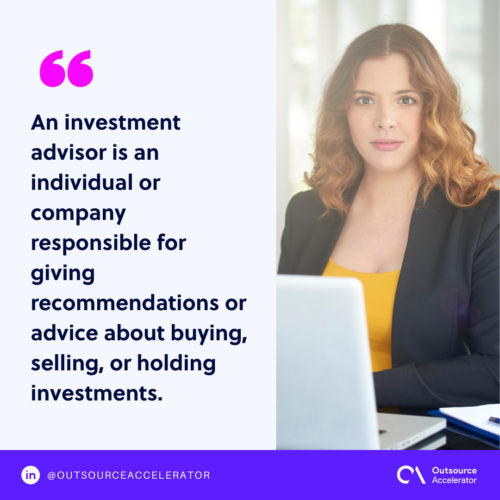Investment advisor
Definition
What is an investment advisor?
An investment advisor is an individual or company responsible for giving recommendations or advice about buying, selling, or holding investments. They are also sometimes referred to as stock brokers.
They provide advice and conduct analysis on the performance of securities in terms of stocks, mutual funds, bonds, exchange-traded funds (ETFs), limited partnerships, commodity pools, and others in return for compensation.
Investment advisors are paid through the direct management of assets of their clients or by means of written publications.
They are regulated by the Securities and Exchange Commission (SEC) as registered investment advisors (RIA).
According to the Investment Adviser Association, a record-breaking growth in the investment advisor industry experience in 2020. Amid the COVID-19 pandemic, there has been a significant rise in numbers, and there are 13,880 SEC-registered advisory firms as of 2020.
Additionally, those firms consist of 880,000 employees handling $110 trillion in assets and providing service for 60.8 million clients across the globe.

What are the roles of an investment advisor?
Investment advisors owe a fiduciary duty, which means they are bound to carry more loyalty to their clients and uphold clients’ interests over personal interests.
An investment advisor must have a wide array of expertise in different areas of investment. This involves being knowledgeable about different investment styles and strategies, such as value investing and growth investing.
These advisors also specialize in stocks, equities, bonds, and other assets that might help in managing and shaping the diversified portfolios of each client.
What is the difference between investment advisors and financial advisors?
There are key differences between investment advisors and financial advisors. While they are both regulated by the SEC, investment advisors are also subject to state regulations while the latter is controlled by the Financial Industry Regulatory Authority (FINRA).
In terms of qualifications, investment advisors must pass exams such as the Series 65 and Uniform Investment Adviser Law Examination. Financial advisors, meanwhile, take the Series 6 or Series 7 exam.
Further, investment advisors can be a person or company that puts more focus on investment-related concerns. On the other hand, a financial advisor is someone that can give financial advice in every aspect of a client’s life.
US Investment Advisers Act of 1940
There is an established precise definition of the investment advisor depending on the nation belongs to, and they are governed by certain laws. For instance, the Investment Advisers Act of 1940.
Investment Advisers Act of 1940 is a law that regulates investment advisors, particularly in the United States. As such, this act advises only advisers who have at least $100 million of assets, which are under management or under-investment company, are advised to register with the Commission.
As of the US Investment Advisers Act of 1940, there are several pieces of advice that the investment advisors may provide that, including:
(i) advice about market trends is advice about securities;
(ii) advice about the selection and retention of other advisers is advice about securities;
(iii) advice about the advantages of investing in securities versus other types of investments (e.g., coins or real estate) is advice about securities;
(iv) providing a selective list of securities is advice about securities even if no advice is provided as to any one security; and
(v) asset allocation advice is advice about securities.
The investment advisors monitor and ensure that the investment is performing very well and aligned with investment goals and objectives.
Generally, if one is experiencing a complicated financial situation, specifically in investment, it is more advantageous to hire an investment advisor who is qualified to help manage finances.







 Independent
Independent




